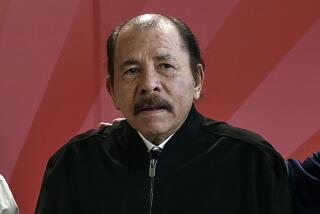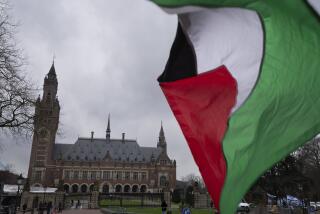Rwanda War Crimes Tribunal Mismanaged, Report Says
- Share via
UNITED NATIONS — Mismanagement in the administration of an international court set up by the U.N. to prosecute war criminals in Rwanda has hampered the investigation of the 1994 genocide there, a report released Wednesday said.
The U.N. inspector general uncovered faulty accounting practices, hiring of unqualified applicants, widespread disregard of U.N. regulations and feuding among top officials at the tribunal’s administrative headquarters in Arusha, Tanzania. It also cited neglect of the problems by U.N. officials in New York.
These problems and others, including a law library nearly bereft of books and a shortage of courtrooms and jail cells, have slowed the effort to bring to justice those responsible for genocide and other crimes against humanity, said Karl Paschke, head of the U.N. Office for Internal Oversight. “We owe it to the half-million victims of genocide in Rwanda to do better,” Paschke said, noting that “justice has been delayed.”
The report represents an early test for new U.N. Secretary-General Kofi Annan, who has promised reforms in the world body. U.N. critics are likely to seize on the excesses cited in the report, which covers a period preceding Annan’s election. Annan already has replaced some administrators at the tribunal but is not expected to announce further action until after a Feb. 21 meeting in New York with the court’s top executives.
Paschke’s investigators concluded that the court, the International Criminal Tribunal for Rwanda, was dysfunctional in every administrative area. Among the findings:
* The cash fund at the tribunal’s offices in Arusha and in Kigali, Rwanda, sometimes totaled as much as $600,000, but there were no written rules for disbursing it.
* Payroll procedures were so erratic that, while some staff went months without receiving their wages, others were paid twice for the same work. One staffer had his contract extended while he owed the U.N. $34,000 for improper pay.
* Administrators routinely hired employees who failed to meet U.N. requirements, including a finance director who had no degree in finance, accounting or administration and a procurement chief who had no experience in U.N. procurement procedures.
* Andronico Adede of Kenya, the tribunal’s chief administrator, spent half of his time on duty traveling in the region on official business, drawing him away from the woes at the tribunal.
* Court operations were disrupted by disputes between Adede and chief prosecutors--Richard Goldstone of South Africa and later, Louise Arbor of Canada--and between chief prosecutors and the deputy prosecutor in Kigali, Honore Rakotomanana of Madagascar.
* Officials at the U.N. secretariat in New York took the attitude that the tribunal was not their responsibility and did not deal with the problems.
Despite the findings, Paschke said investigators uncovered no firm evidence of corruption, misuse of funds, nepotism or racism, as some critics have alleged.
Tribunal officials in Arusha refused to comment on the report, which they said they had not read.
The tribunal was established in November 1994 to prosecute ethnic Hutus who slaughtered hundreds of thousands of ethnic Tutsis and moderate Hutus earlier that year. The court has indicted 21 people, has 13 in custody and has begun one trial.
More to Read
Sign up for Essential California
The most important California stories and recommendations in your inbox every morning.
You may occasionally receive promotional content from the Los Angeles Times.










